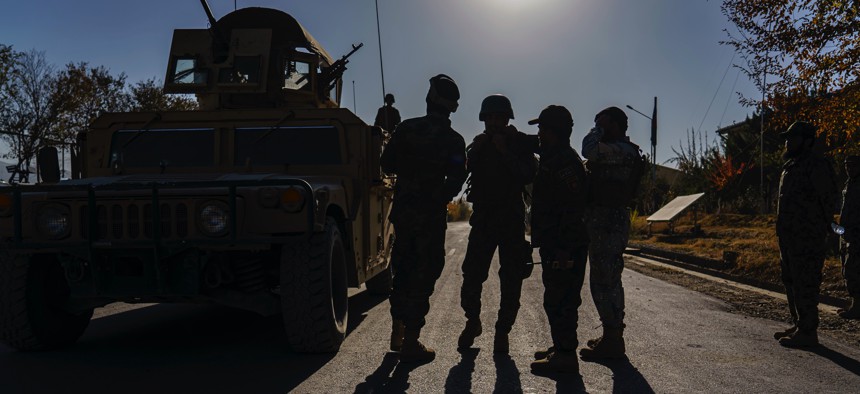
Afghan National Army troops at their base on the outskirts of Maidan Shahr, Afghanistan, on Nov. 7, 2020. Marcus Yam / Los Angeles Times via Getty Images
US, NATO Troops to Withdraw from Afghanistan by 9/11, US Official Says
Decision for a September pullout follows “rigorous policy review.”
President Joe Biden has directed that all remaining U.S. forces be withdrawn from Afghanistan by September, which would end America’s longest war 20 years after it started. NATO troops will also depart, a senior administration official told reporters on a briefing call Tuesday.
“After a rigorous policy review, President Biden has decided to draw down the remaining troops from Afghanistan and finally end the U.S. war there after 20 years,” the senior administration official said. “We will begin an orderly drawdown of the remaining forces before May 1 and plan to have all U.S. troops out of the country before the 20th anniversary of 9/11.”The senior administration official also said all NATO troops will depart, an announcement that came one day before Defense Secretary Lloyd Austin was set to meet with NATO allies in Brussels.
“We have discussed the drawdown with our NATO allies and operational partners,” the administration official said. “We will remain in lockstep with them as we undergo this operation. We went in together, adjusted together, and now we will prepare to leave together.”
Biden was expected to make a formal announcement of his decision on Wednesday, spokeswoman Jen Psaki told reporters at the White House press briefing Tuesday.
The administration plans to leave “sufficient” forces in the region to conduct counterterrorism missions and check the Taliban but those decisions have not been finalized. The official said Pentagon officials would announce those moves, but did not expect a decision within the next few days.
For the last several months, the administration has faced questions about whether it would abide by the May 1 withdrawal date set by former President Donald Trump.
The decision was welcomed by veterans groups on both sides of the political spectrum, who often advocated together for an end to the military’s presence in Afghanistan.
“While we still believe a full withdrawal by the May 1st deadline in the Doha agreement best serves America’s interests, we are pleased to hear President Biden is firmly committed to bringing our troops home within the next few months. America has more pressing priorities at home and elsewhere, and President Biden must keep his promise to end our endless war in Afghanistan,” said Dan Caldwell, senior adviser to Concerned Veterans for America, a conservative-leaning veterans group.
“Promises made, promises kept. This is such great news, @POTUS,” tweeted the progressive veterans group VoteVets.org
In its decision, the administration was weighing the costs of withdrawal, which security analysts have cautioned could cause Afghanistan to fall back into Taliban control, cost gains made in women’s rights and self-governance against the long-term cost on U.S. service members and taxpayers on the 20-year military engagement.
On April 9, the Office of the Director of National Intelligence released the intelligence community’s annual threat report. Of Afghanistan, it said, “We assess that prospects for a peace deal will remain low during the next year. The Taliban is likely to make gains on the battlefield, and the Afghan Government will struggle to hold the Taliban at bay if the coalition withdraws support.”
Sen. Jim Inhofe, R-Okla., the ranking member of the Senate Armed Services Committee, called Tuesday’s announcement “dangerous.”
“No one wants a forever war, but I’ve consistently said any withdrawal must be conditions-based. Arbitrary deadlines would likely put our troops in danger, jeopardize all the progress we’ve made, and lead to civil war in Afghanistan,” Inhofe said.
More than 2,400 U.S. troops have been killed in Afghanistan and more than 20,000 wounded there during the 20-year war, according to the Pentagon’s defense casualty reports. Attempts to fully withdraw forces from Afghanistan have failed for years as political instability and rising levels of attacks on Afghan civilians and their security forces led to calls at home to stay, and in some cases, increase U.S. levels of military involvement. When Joint Chiefs Chairman Gen. Mark Milley was asked in March about how soon a withdrawal might be possible, he said, “You have American troops there, but you also have NATO troops, you also have contractors from third countries, and then you have Afghans that have supported the United States, etc., And NATO. So on. All of these are factors bearing on the problem of whether or not and how and how long it takes to get out, stay in.”
The departure also raises questions about the welfare of thousands of locals who have worked with U.S. forces as translators or in other capacities over the last two decades, and what the U.S. is willing to do to protect them as forces depart.
“The United States has dealt with foreign countries in the past and we have always tried to help out those that were supporting us throughout this armed conflict, and I think that there's a degree of moral obligation to support those who have supported us in these various conflicts,” Milley said, noting he did not know the specifics of each potential case.
Defense One technology editor Patrick Tucker contributed to this report.







